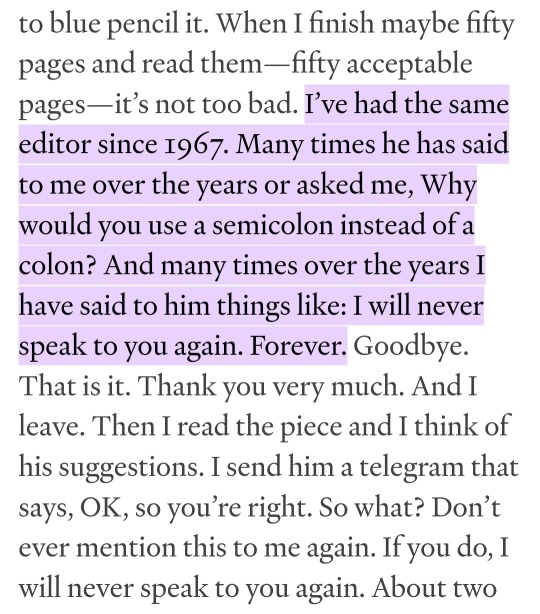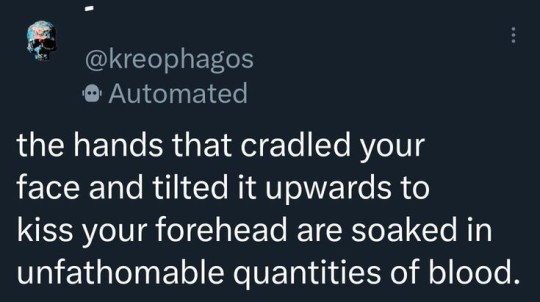This has turned into a whump blog for the most part, but there's still other writing stuff in the archive and I can't keep a theme so other stuff will show up anyway.
Don't wanna be here? Send us removal request.
Text
The ScriptX family as of 01/01/2018
Have writing questions, but don’t know who to ask? Check out the ScriptX family of blogs, all of whom provide detailed writing advice on a huge variety of topics!
First, ScriptFeature shares some of the best posts from the ScriptX blogs, as well as giving updates and announcements about the family: @scriptfeature
The rest of the blogs are in alphabetical order in two groups, with active blogs first, and inactive/archived blogs second. If you are looking for something in particular, try searching using Ctrl+F or ⌘+F
Active:
Accountant: @scriptaccountant (Accounting)
Autistic: @scriptautistic (Autistic characters)
Ballerina: @scriptballerina (Ballet and dance)
Canuck: @scriptcanuck (Everything Canadian)
Chemist: @scriptchemist (Chemistry and chemical laboratories)
Criminal justice: @scriptcriminaljustice (Criminal justice system, including court procedures and criminal investigations)
Equestrian: @scriptequestrian (Horseback riding)
Firefighter: @scriptfirefighter (Firefighting, including fire science and safety, forced entry, rescue, HazMat and related topics)
Florist: @scriptflorist (Flowers, florists and flower shops)
Foodie: @scriptfoodie (Food and drink)
Genetics: @scriptgenetics (Genetics and evolutionary biology)
German: @scriptgerman (Everything German)
Hacker: @scripthacker (Data retrieval, steganography, cryptography, white hat hacking, and general purpose computing)
History: @scripthistory (History) [on hiatus]
LGBT: @scriptlgbt (LGBTQ+ characters, community, and issues)
Librarian: @scriptlibrarian (Librarians and libraries)
Medic: @scriptmedic (The original! Medicine, human anatomy/physiology, hospitals, EMTs and paramedics)
Myth: @scriptmyth (Mythology and folklore from around the world)
Pastor: @scriptpastor (Religion and people of faith)
Sailor: @scriptsailor (Navy, sailors and nautical history)
Script a world: @script-a-world (Worldbuilding for science fiction and fantasy)
Script structure: @scriptstructure (Story structure, narrative and themes)
Shrink: @scriptshrink (Clinical psychology, psychiatry, therapy and therapists)
Sociology: @scriptsociology (Social sciences applied to world building)
Spoonie: @scriptspoonie (Characters with chronic illness, disability)
Torture: @scripttorture (Torture methods, torture victims, and torturers throughout history)
Trauma Survivors: @scripttraumasurvivors (Writing survivors of psychological trauma)
Veterinarian: @scriptveterinarian (Veterinary medicine for animals domesticated, wild and occasiontally fantastical)
Witchcraft: @scriptwitchcraft (Witchcraft)
Archived/Inactive: These blogs are not currently active but are still a useful resource when researching your stories
Astronomer: @scriptastronomer (Astronomy)
Brain Scientist: @scriptbrainscientist (Neurology) [ARCHIVED]
Brit: @scriptbrit (United Kingdom) [ARCHIVED]
Economist: @scripteconomist (Ecomonics) [ARCHIVED]
Educator: @scripteducator (Schools and teachers)
Kink: @scriptkink (Sex and sexuality)
Lawyer: @scriptlawyer (Legal stuff)
Linguist: @scriptlinguist (Linguistics)
Pharmacist: @scriptpharmacist (Pharmacies and pharmaceuticals)
Politics: @scriptpolitics (Politics, world-building political systems, and international relations) [ARCHIVED]
Publishing industry: @scriptpublishingindustry (Publishing industry, including writers, editors etc)
Service Dogs: @scriptservicedogs (Service dogs, emotional support animals, and therapy dogs)
Social work: @scriptsocialwork (Social workers and the field of social services) [ARCHIVED]
To get the most up-to-date version of this list, be sure to check this link here: scriptshrink.tumblr.com/scriptfamily
Are you an expert in a topic? Interested in joining the ScriptX family? Apply here!
1K notes
·
View notes
Text
Live theater in the His Dark Materials universe must be wild. Surely an actor's daemon also has lines to recite, so their daemon's form probably also factors into casting decisions. Maybe some plays have vague character descriptions for daemons, but I bet other plays have really specific or central daemon characters. And sure, big-budget theaters can afford to hire a separate actor with a particular daemon to stand backstage while their daemon plays its part onstage, but community theaters don't have those kinds of resources.
Like if you're casting for Julius Caesar, surely the real historical Caesar had a pretty iconic daemon, right? Are you going to cast an actor with a pigeon daemon as Caesar and just have everyone suspend their disbelief that it's Caesar's lioness, ἁμαρτία?
33K notes
·
View notes
Text
What able bodied authors think I, an amputee and a wheelchair user, would want in a scifi setting:
Tech that can regenerate my old meat legs.
Robot legs that work just like meat legs and are functionally just meat legs but robot
Literally anything that would mean I don't have to use a wheelchair.
If I do need to use a wheelchair, make it fly or able to "walk me" upstairs
What I actually want:
Prosthetic covers that can change colour because I'm too indecisive to pick one colour/pattern for the next 5+ years.
A leg that I can turn off (seriously, my above knee prosthetic has no off switch... just... why?)
A leg that won't have to get refitted every time I gain or loose weight.
A wheelchair that I can teleport to me and legs I can teleport away when I'm too tierd to keep walking. And vice versa.
In that same vein, legs I can teleport on instead of having to fiddle around with the sockets for half an hour.
Prosthetic feet that don't require me to wear shoes. F*ck shoes.
Actually accessible architecture, which means when I do want to use my wheelchair, it's not an issue.
Prosthetic legs with dragon-claw feet instead of boring human feet or just digigrade prosthetics that are just as functional as normal human-shaped ones.
A manual wheelchair with the option to lift my seat up like those scissor-lift things so I'm not eye-level with everyone's butt on public transport/so I can reach the top shelf by myself.
A prosthetic foot that lights up when it hits the ground like those children's shoes.
51K notes
·
View notes
Text

memes are fun and relatable and all that, but don't let them discourage you. all of that stuff that doesn't make it into the final product is part of how the final product gets made
31K notes
·
View notes
Text
don't underestimate the importance of having little jokes in your story. not every joke has to be the most clever funniest thing ever, just a little something to make you giggle will do. dime store jokes. stocking stuffer jokes. pause for a little gag and then continue on with the story, it adds good flavor
12 notes
·
View notes
Text
There are a lot of abuse and recovery stories out there in fandom. A lot of them are written by people who’ve never been in an abusive relationship. That’s fine, that certainly doesn’t mean you can't write it, especially when it’s present in canon. Unfortunately, it does mean that a lot of people get it wrong.
The usual abuse narrative you see in fandom is a story about absence. The lack of safety. The lack of freedom. The lack of love, or of hope, or of trust. They try to characterize the life of an abused kid, or an abused partner, based on what’s missing. They characterize recovery based on getting things back: finding safety, discovering freedom, and slowly regaining the ability to trust–other people, the security of the world, themselves.
That doesn’t work. That is not how it works.
Lives cannot be characterized by negative space. This is a statement about writing. It’s also a statement about life.
You can’t write about somebody by describing what isn’t there. Or you can, but you’ll get a strange, inverted, abstracted picture of a life, with none of the right detail. A silhouette. The gaps are real but they're not the point.
If you’re writing a story, you need to make it about the things that are there. Don’t try to tell me about the absence of safety. Safety is relative. There are moments of more or less safety all throughout your character’s day. Absolute safety doesn’t exist in anyone’s life, abusive situation or not.
If you are trying to tell me a story about not feeling safe, then the question you need to be thinking about is, when safety is gone, what grows in the space it left behind?
Don’t try to tell me a story about a life characterized by the lack of safety. Tell me a story about a life defined by the presence of fear.
What's there in somebody’s life when their safety, their freedom, their hope and trust are all gone? It’s not just gaps waiting to be filled when everything comes out right in the end. It’s not just a void.
The absence of safety is the presence of fear. The absence of freedom is the presence of rules, the constant litany of must do this and don’t do that and a very very complicated kind of math beneath every single decision. The lack of love feels like self-loathing. The lack of trust translates as learning skills and strategies and skepticism, how to get what you need because you can’t be sure it’ll be there otherwise.
You don’t draw the lack of hope by telling me how your character rarely dares to dream about having better. You draw it by telling me all the ways your character is up to their neck in what it takes to survive this life, this now, by telling me all the plans they do have and never once in any of them mentioning the idea of getting out.
This is of major importance when it comes to aftermath stories, too. Your character isn’t a hollow shell to be filled with trust and affection and security. Your character is full. They are brimming over with coping mechanisms and certainties about the world. They are packed with strategies and quickfire risk-reward assessments, and depending on the person it may look more calculated or more instinctual, but it’s there. It’s always there. You’re not filling holes or teaching your teenage/adult character basic facts of life like they’re a child. You’re taking a human being out of one culture and trying to immerse them in another. People who are abused make choices. In a world where the ‘wrong’ choice means pain and injury, they make a damn career out of figuring out and trying to make the right choice, again and again and again. People who are abused have a framework for the world, they are not utterly baffled by everyone else, they make assumptions and fit observations together in a way that corresponds with the world they know.
They’re not little lost children. They’re not empty. They’re human beings trying to live in a way that’s as natural for them as life is for anybody, and if you’re going to write abuse/recovery, you need to know that in your bones.
Don’t tell me about gaps. Tell me about what’s there instead.
23K notes
·
View notes
Text
When you were selected as the Chosen One, you were showered with gifts, training, and a new cushy room in the castle. The Kingdom thought you would automatically be on their side, but the memories of your impoverished childhood will never fade.
9K notes
·
View notes
Text
You already know the story. You will die. Everyone you love will also die. You will lose them forever. You will be sad and angry. You will weep. You will bargain. You will make demands. You will beg. You will pray. It will make no difference. Nothing you can do will bring them back. You know this. Your knowing changes nothing. This poem will make you understand this unfathomable truth again and again, as if for the very first time.
Emily Wilson, an excerpt of her introduction to The Iliad
849 notes
·
View notes
Text
the transition from people needing each other to wanting each other is literally one of my greatest weaknesses that shit makes me want to walk into the sea and sit on the ocean floor for a thousand years
60K notes
·
View notes
Text
So you want to try hardboiled fiction: a primer
I’m in the process of posting a Star Wars detective noir story, and the response has been way more than I imagined! When I started posting it, I thought my main audience would be people who, like me, think that basically every genre would be better if noir was added to it. Apparently, there’s a lot of people reading this story who are getting introduced to the genre through my story, which is a very pleasant surprise!
(I myself got introduced to noir through a fanfiction and also the SBF playthrough of LA Noire.)
To the people venturing into the waters of hardboiled fiction: Welcome! If you like crime, wisecracking detectives, and grimy cities, perhaps these mean streets are the streets for you.
For this primer, I’ll be going over what hardboiled fiction is, then selected works you can try out. I wouldn’t say I’m an expert on hardboiled fiction, but I did a fair amount of research (aka reading books) for my urban fantasy alternate history detective noir novel, so I’m basically just gonna run through what I know. This guide’s going to be very non-comprehensive, but it’ll give you a place to start.
Keep reading
41 notes
·
View notes
Text

maya angelou saying the funniest thing anyone has ever said about editing, which i can never let myself forget EVER AGAIN [x]
59K notes
·
View notes
Text
You got pulled over after a weekend camping trip. When the officer returns to your car, he says you’ve been missing for fifteen years.
3K notes
·
View notes
Text
If you were the handsome blonde flag bearer in yellow at the Battle of Prestonpans Jacobites Rising of 1745 I’m sorry if I knew you and didn’t recognise you if that’s why you kept staring at me, I didn’t want to wave during the battle and look like a fool
29K notes
·
View notes
Text
hey folks, I’m gonna introduce you to two very important fandom terms and they are watsonian and doylist
they come (obviously) from the sherlock holmes fandom, and they are two different ways of explaining something in a story. say I’m a fan and I notice that, in the original books, watson’s war wound is sometimes in his leg and sometimes in his shoulder. the watsonian explanation is how watson (that is, a person within the story) might explain it; the doylist explanation is how sir arthur conan doyle (a person in real life) would have explained it.
sherlock explains the migrating war wound by making the shoulder wound real and the limp psychosomatic. the guy ritchie films explain it by having the leg wound sustained in battle before the events of the film and the shoulder wound happen onscreen. the doylist explanation, of course, is that acd forgot where the wound was.
this is very important when we’re discussing stuff like headcanons and word-of-god. I see this when people offer watsonian explanations for something, and then a doylist will say something like “it’s just because the author wrote it that way,” and I see it when a person is criticizing bad writing/storytelling (for example, the fact that quiet in metal gear solid v is running around the whole game in a bikini and ripped tights) and someone comes back with “but there’s an in-story reason why that happens!” (that reason being she breathes through her skin).
there’s nothing wrong with either explanation, and really I think you need both to understand and analyze a text. a person coming up with a watsonian explanation has likely not forgotten that the author had real-life reasons for writing something that way, and a person with a doylist interpretation is likely not ignoring the in-universe justification for that thing.
but it’s very difficult (and imo often useless, though there are exceptions) to try to argue one kind of explanation with the other kind. wetblanketing someone’s headcanon with “or it could just be bad writing” is obnoxious; dismissing someone’s criticism with “but have you considered this in-universe explanation” is ignoring the point of the criticism. understanding where someone is coming from is important when making an argument; acting like your argument is better because you’re being doylist when they’re being watsonian or vice versa is not.
51K notes
·
View notes
Text
*flirtatiously* die horribly in this time loop often?
9K notes
·
View notes
Text
look all i'm saying is if you've ever seen someone be healed with magic, congratulations! you've witnessed a practitioner of necromancy. it's the exact same thing. all you're doing at a fundamental level is using magic to accelerate existing biological processes and animate tissue, the only difference is when you do it to dead tissue instead of living tissue, suddenly it's evil scary ~dark magic~ instead of good wholesome healing. it's purely cultural bias.
so no i don't think it's fair to say i "lied on my application" since i'm just as qualified as anyone to heal your party, but hey if you want to be a fucking narc and report me to the wizard council go right ahead. good luck finding an accredited healer at the wages you're offering by the way
10K notes
·
View notes

